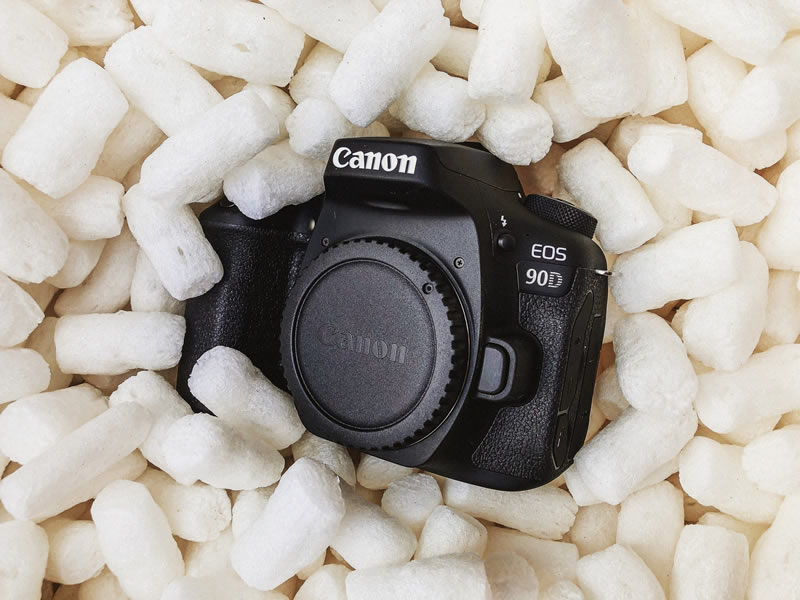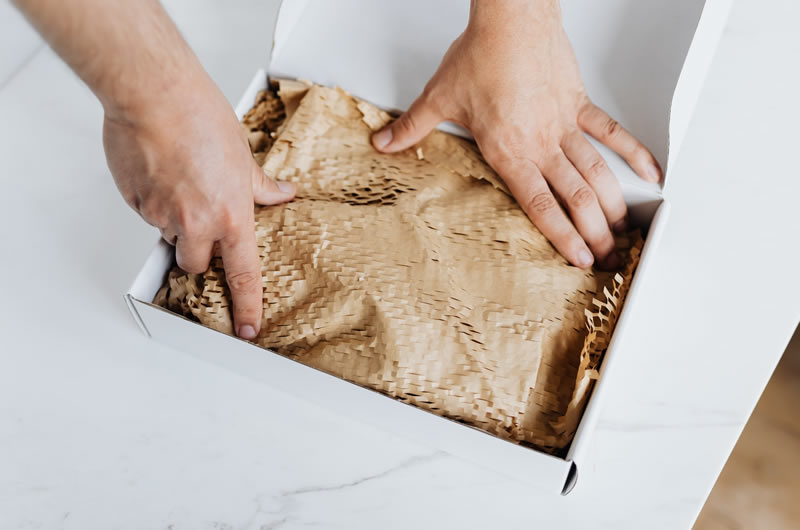What do you think about recycling? I’m sure you’ve bought some cool gadgets recently and you got them in a transport box filled with packing peanuts. Now you probably don’t know what to do with it and ask yourself: “are packing peanuts recyclable?“.
Yes, packing peanuts are recyclable. Though, recycling packing peanuts isn’t easy as it sounds. Packing peanuts are made of Expanded polystyrene (EPS). EPS is also known as plastic #6, which is not accepted by many curbside programs. It has to be recycled by certain ecological standards and you’ll probably have to take it to the local drop-off center. However, they can be recycled to make new EPS products.
In the following article, I will present to you some interesting facts about packing peanuts. I will give you detailed information about it and explain to you are packing peanuts recyclable. I hope you’ll enjoy reading it. Let’s start the ride!

- Are packing peanuts recyclable at all?
- How are packing peanuts recycled?
- Where to recycle packing peanuts?
- How to dispose of packing peanuts?
- Why and how to reuse packing peanuts?
- Are packing peanuts biodegradable?
- What are biodegradable packing peanuts made of?
- How to tell if packing peanuts are biodegradable?
- How to dispose of water-soluble packing peanuts?
- Frequently asked questions
- Conclusion
Are packing peanuts recyclable at all?
You may find packing peanuts handy for multiple purposes. It doesn’t matter are you moving, transporting, buying, or selling something, packing peanuts will help you to protect your electronic devices, glassware, or any other fragile items. Yet, even if it’s useful, it’s a huge pollutant. So, you probably have doubts are packing peanuts recyclable?
Yes, they are recyclable, but there are different types of packing peanuts and they are being treated in different ways. You can differ them by color. Those are not just random colors, they are official color codes for packing peanuts and I’ll present you with a few main types of them.
White and pink: These are the most common colors of packing peanuts. White and pink colors are indicators that these packing peanuts are made of 70% raw, non-recycled material and are not biodegradable. It needs to be disposed to the local drop-off center.
Green: Green packing peanuts are the closest to eco-friendly you can get. The green color indicates that it’s made of 70% recycled material and it’s biodegradable if you dump it in nature. So, if you’re buying packing peanuts, make sure they are green.
Still, my advice is, if you’re thinking about the environment, to not use it at all. If you are packing something, try to find an alternative, such as wrapped newspapers, cardboard, or pieces of old clothes.
If you are purchasing something online, ask a seller about packing. Many of them are offering alternatives to packing peanuts.

How are packing peanuts recycled?
Do you know how are packing peanuts recycled? First, it’s important to define recycling. Recycling means converting some material back into raw material.
According to that, expanded polystyrene (EPS) can’t be technically recycled. Once expanded, EPS can’t be un-expanded. In other words, you can’t turn expanded polystyrene into raw polystyrene.
However, EPS can be converted into a new EPS product. Usually, this process goes into three steps. The first step is to compress EPS into large blocks. In the next step, large blocks are shredded into pellets.
Then, in the last step, these pellets are used for the creation of new EPS products, such as packing peanuts and many other plastic items.
Where to recycle packing peanuts?
If you want to know where to recycle packing peanuts, you need to know are your packing peanuts are water disposable or not.
If you have green packing peanuts, it means they are water-soluble and you can check them below in the article.
If your packing peanuts are made of Styrofoam, you can probably recycle them in your local area. Many companies, such as FedEx, UPS, and many others are offering pick up of peanuts at your home at no charge.
Many of them have organized drop-off centers where you can take your packing peanuts.
How to dispose of packing peanuts?
Packing peanuts disposal is determined by the type of it. If you have doubts about how to dispose of packing peanuts, first you need to know do you have biodegradable peanuts or not.
If you have biodegradable packing peanuts, I put detailed instructions for them in the separate chapter below.
To test it, put a few pieces of packing peanuts into water. If the material starts to dissolve, you have organic packing peanuts and they can be put into the compost bin. If you have non-biodegradable packing peanuts, there are a few options for you, so take the next steps.
Contact a packing supply company. Many companies, such as FedEx, or UPS are in high demand for packing peanuts.
You can contact them and check can they pick it up. It’s important to know that they will pick up only clean material, with no stretch tape, or any other debris.
Call a local recycling center or a local EPS factory. Many EPS producers have organized local drop-off centers where they are recycling packing peanuts. Some of them even do mail-back recycling, in case you don’t have a recycling center nearby.
Donate it to a local school or craft center. Many schools are accepting packing peanuts as gifts. They are using it for packing or some craft projects. Also, you can check in a local community center, there’s always someone who needs it.
Why and how to reuse packing peanuts?
If you still have doubts about why and how to reuse packing peanuts, I’ll give you a few reasons for that.
Take care of your environment. Packing peanuts are highly pollutant. Recent ocean studies have shown that packing peanuts and other EPS are the most common sources of marine debris.
Often, birds and fish mistake it for food, which leads to a slow and painful death.
It could be dangerous for animals. EPS is made of petroleum, which means it could be toxic if it’s digested. Animals, especially dogs, can’t easily differentiate packing peanuts from food. If they find it on the floor they will eat it, which could be fatal.
After you saw all the consequences of dumping the packing peanuts, now I’ll give you a few ideas on how to reuse packing peanuts instead of throwing them in the garbage.
1. Reuse it for shipping. It’s a primary purpose of packing peanuts and it has unlimited use. If you don’t need it at the moment, save it for later, I’m sure you’ll have to send something soon.
2. Use it as a stuffing. Packing peanuts are small and lightweight. You can use it to stuff multiple items, such as pillows, lazy bags, toys, and many other items. It can be used over and over again.
3. Decorate a Christmas tree. Packing peanuts can be a great decoration for your Christmas tree. All you need is a bit of glue, a string, a few glitter colors, and a lot of imagination.
4. Fill large planters. If you have large plants in your home, then you know they need a lot of soil. You can use packing peanuts to cover the bottom part of the pot. Just add soil on top of it and put the plant in a pot.
Are packing peanuts biodegradable?
The answer to the question are packing peanuts biodegradable: yes, some of them. If you have green packing peanuts, it means they are made of 70% biodegradable materials and are biodegradable.
What are biodegradable packing peanuts made of?
Now you’re probably wondering what are biodegradable packing peanuts made of? They are made of natural, non-toxic sources, such as wheat and corn starch. They are not toxic if eaten.
It’s important to add that nutrition value has been removed from it.
How to tell if packing peanuts are biodegradable?
If you don’t know how to tell if packing peanuts are biodegradable, I’ll discover you a simple trick that is 100% accurate: just need to place a few of them under a faucet and turn the water on.
Wait for a few minutes and see what’s going on. If you have natural packing peanuts, they will start to dissolve. If you have a Styrofoam, it will remain unaffected by water.
How to dispose of water-soluble packing peanuts?
If you have natural, water-soluble packing peanuts and you want to dispose of them, the process is as simple as it gets. You have a few different methods of disposal.
Put it in your sink. It’s necessary to put it into the sink or a bathtub and just run the water until they dissolve.
Decompose it in your garden. Green packing peanuts are made of plants, so if you put them in your garden, they will decompose and enrich your soil.
Drop it in a bin. It’s even enough just to drop it in the bin with the other organic trash. It will simply go through the composting process. Just add some warm water and it will decompose.
Frequently asked questions
Now I’m gonna answer some of the most frequently asked questions about this topic. I hope you’ll find all the answers you need.
Is there a difference between Styrofoam and expanded polystyrene?
I’ll try to make it simple: every Styrofoam is EPS, but every EPS isn’t Styrofoam. Styrofoam is a branded product of Dow Jones chemical company. It’s rough and it’s breaking when you fold it. EPS, such as packing peanuts is softer and can easily bend without breaking.
Where can I purchase biodegradable packing peanuts?
Almost everywhere. You can buy it in almost every store that sells packaging material. If you searching it locally, you can find it in a local Uhaul office. If you’re buying it online, you can find it on Amazon, or some other online store.
Can I recycle packing peanuts for money?
No, not yet. The best you can do is to give it to the local shipping company and ask for a shipping discount.
Does Amazon use biodegradable packing peanuts?
No, they do not. They don’t use any type of packing peanuts at all. They are eco-friendly. As the biggest market in the world, it would be disastrous if they use it. However, 3rd party sellers on Amazon, that don’t use their fulfillment service, may use it.
Conclusion
I hope you enjoyed this article. I introduced you to the packing peanuts and gave you an answer are packing peanuts recyclable. I tried to cover the topic from different angles and I hope I did it.
If you still have any questions or doubts, please, send us a message. Ask questions, comment, and I’ll be glad to respond to all of them.

A very informative article. Thank you for spelling out the recycling options clearly.